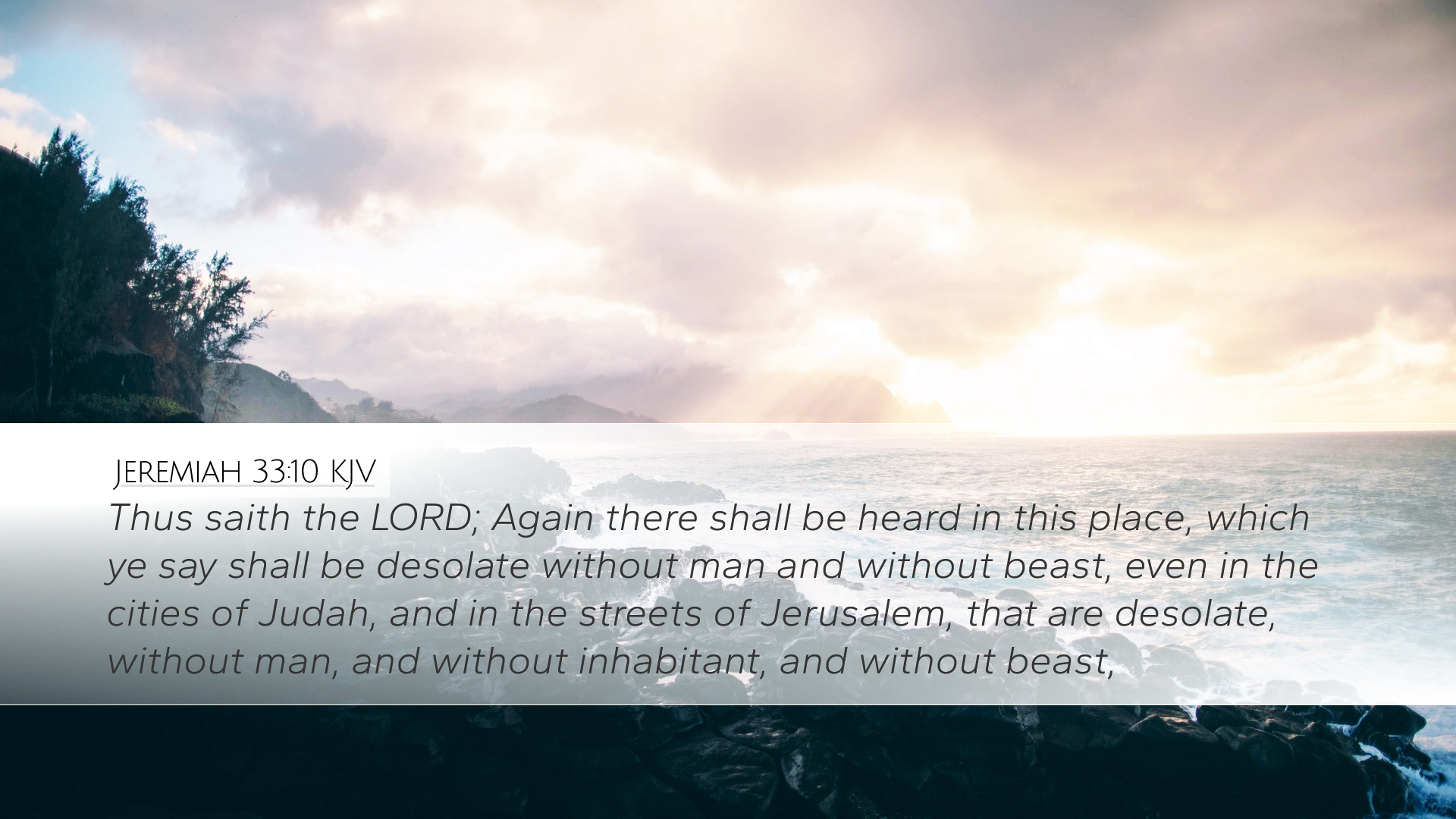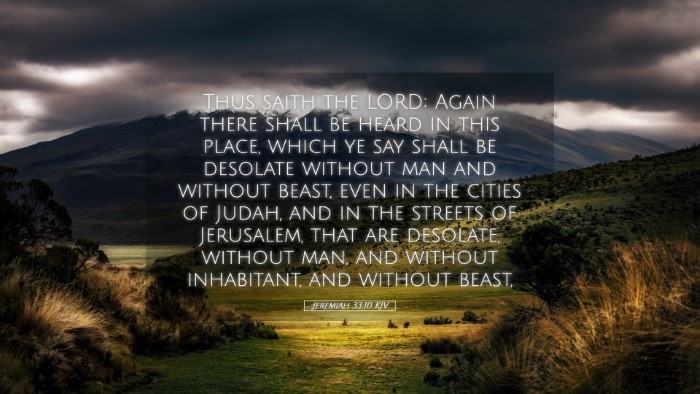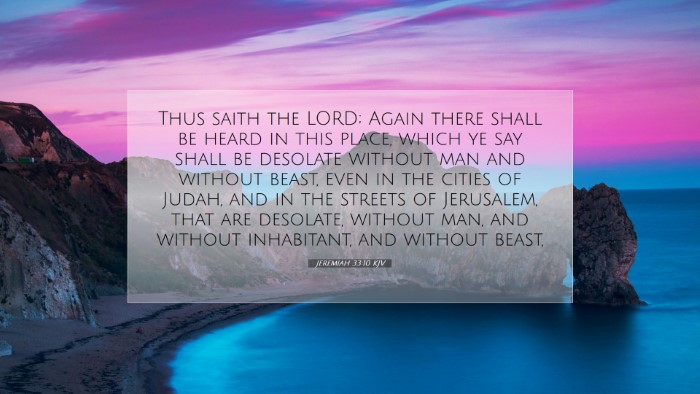Commentary on Jeremiah 33:10
Verse Context: Jeremiah 33:10 states, "Thus saith the Lord; Again there shall be heard in this place, which ye say shall be desolate, without man and without beast, even in the cities of Judah, and in the streets of Jerusalem, that are desolate, without man, and without inhabitant, and without beast," (KJV). This verse emerges during a time of great struggle and despair in Jerusalem as the Babylonian siege looms over the city.
Historical Background
The Book of Jeremiah is set against the backdrop of the impending Babylonian captivity of Judah. Jeremiah, often referred to as the "weeping prophet," communicates God's messages of judgment and hope. As Jerusalem faces destruction, the core message is paradoxically one of restoration. This verse represents a pivotal point where God is reassuring His people of revival and restoration despite their present dire circumstances.
Verse Breakdown and Analysis
- “Thus saith the Lord”: This phrase indicates the divine authority behind the proclamation. It emphasizes that the message is not merely a human expectation but a revelation from God, which carries significant weight and necessity for fulfillment.
- “Again there shall be heard in this place”: The use of the word "again" suggests a return to a previous state of prosperity and vibrancy. Jeremiah anticipates a future where the land, currently desolate, will once again be filled with life, joy, and activity.
- “which ye say shall be desolate”: The people of Judah were caught in despair, declaring their land to be ravaged beyond hope. God counters their pessimism by declaring new life will emerge in the very places they deem hopeless.
- “without man and without beast”: This phrase reflects the eerie silence and absence of life due to war and sin. The focus falls on the profound emptiness that sin and divine judgment leave in its wake. It also underscores the total loss experienced by Jerusalem and its surrounding areas.
Thematic Insights
This verse encapsulates several themes central to biblical theology:
- Hope in Despair: Jeremiah 33:10 serves to ignite hope where there seems to be none. While the current situation appears grim, God’s promise reassures that desolation does not define the future.
- Redemption and Restoration: The passage is a foreshadowing of the ultimate restoration that God would provide, not only for His people after the exile but also in the coming Messiah. It reflects God’s character as one who restores His creation.
- The Sovereignty of God: This statement underlines God’s overarching control over history and destiny, demonstrating that God can bring life from death and hope from despair.
Commentary Insights
- Matthew Henry: Henry emphasizes that even when our circumstances appear desolate, we can take comfort in God’s assurances of revitalization. He suggests the importance of trusting in God’s promises, which transcend our current situations. Henry provides a pastoral encouragement to his readers that God's capabilities extend beyond what we perceive.
- Albert Barnes: Barnes elaborates on the meaning of "desolate," noting that it is not only a temporal condition but represents a broader spiritual barrenness that affects faith and worship. He elaborates on how this verse prefigures the eventual return of the Jewish people and the reconstruction of Jerusalem as a testimony to God’s faithfulness.
- Adam Clarke: Clarke focuses on the cultural implications of the desolation mentioned. He connects the absence of “man and beast” to the broader consequences of sin on society, drawing parallels to the Christian understanding of collective sin leading to societal breakdown. Clarke examines the call for repentance as a precursor to the restoration God promises.
Theological Reflections
This verse speaks profoundly to contemporary believers and leaders:
- Pastoral Applications: For pastors, this verse serves as a powerful reminder to communicate hope to congregations facing crises. The call to remember God’s promises amidst suffering can reignite faith and encourage community resilience.
- Student Insights: For theological students, this verse should prompt discussions around eschatology, divine justice, and the role of prophecy in affirming God’s promises. It invites critical thought about how biblical themes of restoration manifest throughout scripture.
- Scholarly Investigation: Scholars might investigate the historical contexts of the exilic periods and the resultant theological implications. Researchers should explore ancient Israel's sociopolitical landscape to draw comparisons with contemporary issues of desolation and restoration.
Conclusion
Jeremiah 33:10 stands as a beacon of hope amidst despair. It invites the faithful to look beyond immediate adversity and trust in God’s restorative promises. With insights drawn from esteemed public domain commentaries, the verse’s rich theological and practical implications become clear, serving as both a warning and a comfort. In the context of Christian faith, it exemplifies the overarching narrative of redemption, proving that God’s intentions transcend human frailty and circumstance.


